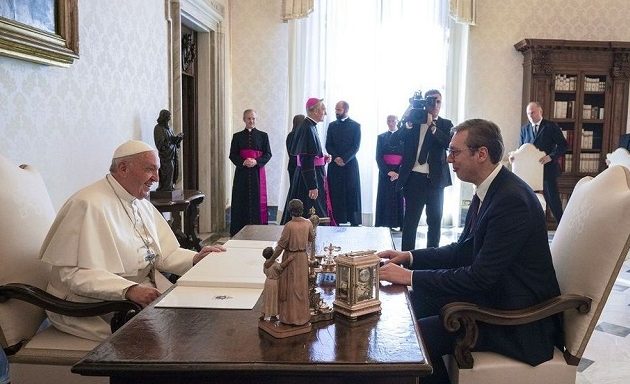SManalysis
Two decades after brokering peace in the former Yugoslavia, Washington plans to try to restart talks between Serbia and Kosovo.
BY ROBBIE GRAMER | AUGUST 30, 2019,
Foreign Policy

.
German Chancellor Angela Merkel speaks with Bulgarian Prime Minister Boyko Borisov, Serbian President Aleksandar Vucic, and Kosovar President Hashim Thaci during a summit on the Balkans in Sofia, Bulgaria, on May 17, 2018. VASSIL DONEV/AFP/GETTY IMAGES
The U.S. State Department is expected to announce a new special envoy on the Balkans in an effort to restart a stalled dialogue between Serbia and Kosovo, aimed at ending a long-simmering dispute in Southeastern Europe.
Matthew Palmer, a career diplomat with experience in the Balkans, is likely to be tapped as the new special envoy, according to current and former officials familiar with the matter. His expected appointment represents the latest push by the United States to address tensions between Serbia and Kosovo, two decades after an armed conflict that sparked a NATO intervention and eventually led to Kosovo breaking off and declaring itself independent from Serbia.
European Union-brokered talks between Serbia and Kosovo to normalize bilateral relations sputtered and stalled last November, after Kosovo slapped steep tariffs on Serbian goods and vowed to only remove them after Serbia recognized Kosovo’s sovereignty.
For some experts, Palmer’s anticipated appointment is a welcome development in a region often overlooked by top U.S. policymakers, at least since the intensive efforts made to end the deadly conflicts in the 1990s. Diplomats warn that Russia and China are expanding their influence in the Balkans, and resolving longstanding disputes in the region would help the countries move closer to the EU and Western institutions.
“The appointment of a new special envoy for the Balkans clearly indicates the United States is getting much more involved in this issue in a formal way,” said Daniel Vajdich, a foreign-policy expert who follows the region and worked on European issues as a staffer on the Senate Foreign Relations Committee and on Republican presidential campaigns. “In my view this increases the likelihood we’re going to find some sort of solution to this issue before the end of the Trump administration.”
But successive efforts by top EU leaders, including foreign-policy chief Federica Mogherini, to help ease tensions between Serbia and Kosovo have so far been unsuccessful. European leaders have been hesitant to discuss adding new members to the EU, a key economic and political incentive for Serbia and Kosovo to strike a final deal, leaving some experts skeptical that a dialogue will go anywhere.
Another current official who spoke to Foreign Policy on condition of anonymity also questioned whether tapping a new U.S. envoy would amount to positive shifts in policy or restart Serbia-Kosovo negotiations. Palmer will retain his current job as deputy assistant secretary of state overseeing the Balkans and Aegean region.
The United States played a leading role in brokering peace in the Balkans after the region erupted into war and ethnic-based violence over two decades ago. More recently, U.S. diplomats also played an important behind-the-scenes role in helping Greece and neighboring North Macedonia strike a historic deal that resolved a name dispute last year, paving the way for North Macedonia to join NATO.
Kosovo, with a nearly 90 percent ethnically Albanian majority, declared independence from Serbia in 2008. While over 100 countries, including the United States and many European nations, recognize Kosovo’s independence, Serbia does not. Nor does Russia, which maintains close ties with Belgrade.
Palmer’s expected appointment comes after a meeting between U.S. Secretary of State Mike Pompeo and Serbian President Aleksandar Vucic in New York earlier this month. Pompeo urged Vucic to restart talks with Kosovo and “engage with the spirit of compromise and flexibility necessary to secure an agreement and unlock both countries’ potential,” according to a State Department readout of the meeting.
U.S. National Security Advisor John Bolton indicated last year that the United States would support a deal between Serbia and Kosovo, including a potential deal that involves territorial exchange between the two countries. Critics argued any land-swap deals could stoke further instability. European countries, including Germany, maintain that such a deal could lead others in the region to demand a redrawing of their own borders, reopening territorial disputes that in part stoked the deadly conflicts in the 1990s.
READ MORE


